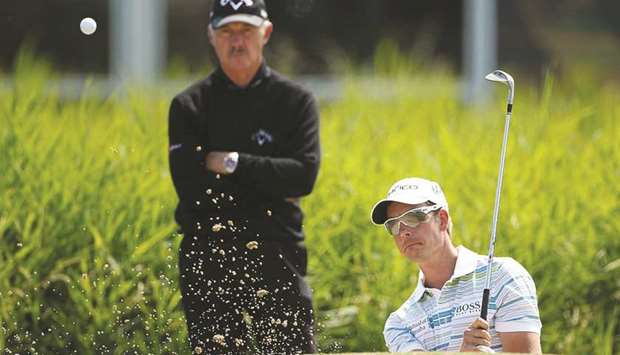When Seve Ballesteros celebrated victory at Royal Lytham & St Annes in 1979 few would have paid attention to the identity of the individual sharing 33rd in the Open Championship. Little did anyone know that an outstanding coaching career was in the embers of creation as a result of that placing. Forty years on, focusing on Pete Cowen is entirely justified.
“I lost money on the week,” Cowen recalls. “I finished 55th in the order of merit – one in front of Bernhard Langer – and lost money on the year. Aged 28, I packed up. Some people now say: ‘Oh he is only 28. F*** me, I was finished at 28.’ I only started golf at 16 and by 19 was playing with Gary Player. People ask: ‘How quickly you can get good; how much do you want it?’”
Recognition of Cowen has been something of a slow burner. At Royal Portrush he has coaching responsibility for 11 of the Open field. Somewhat bashfully he concedes that isn’t even a personal record; his contingent numbered 17 in 2011. “There is a reason they are in majors, they are good players,” Cowen says of plate-spinning. “But you have to manage their time because the nervous energy they use up in majors is massive.”
At last month’s US Open, Gary Woodland delivered a 10th major win – from a possible 37 – for the 68-year?old Yorkshireman. When he eventually returns home, there will be a signed flag and heartfelt note of gratitude from the US Open’s latest champion. Yet Henrik Stenson’s triumph at Royal Troon in 2016 tops them all in Cowen’s mind. “Because of what we came through in the early 2000s. It was horrendous, he couldn’t hit the range with a five-iron. It took about two years, I don’t think I earned £40 from him in that time. My wife calls him my third son.”
The best in golf want association with Cowen partly because of his straight talking. At his first encounter with Brooks Koepka, five years ago, the golfer watched Cowen hole out from a practice bunker at Wentworth. “Fluke” scoffed Koepka before Cowen repeated the feat. “And I’m an old guy,” said Cowen to Koepka. The American, now a multiple major winner, was captivated. “Right, I need to listen, don’t I?”
Cowen explains: “I’m always hard. I can’t be easy on a player. I told one of the top players at Augusta as he was moaning: ‘You know what to do? Get your clubs, get your stuff, get on a plane and get out of here. The Green Jackets don’t give a monkey’s whether you are here or not, you don’t mean anything to them.’ Everybody else was stroking his ego. Not me.”
Having gained a formidable reputation as a tutor at Lindrick Golf Club, Cowen took a call in 1995 from the renowned agent Chubby Chandler. Lee Westwood needed some help. “He had played a third of the season and won £7,000,” says Cowen. “Chubby rang me up and asked what I thought. I said: ‘If he does what I ask him to, he could win half a million quid by the end of the year.’ He had enough talent.” Westwood’s return in that spell? £650,000. He won 25 times in five years.
“I took a massive gamble. I had three kids, a mortgage, a good paying job and gave it up because I thought I could make tour coaching work with Westwood and [Darren] Clarke. It was all on commission and I paid my own expenses.
“Golf is a very simple game made very complicated. One of the problems is that most people have come to it from a moving ball game. People come to golf having learned totally the wrong way, which is to hit it before you learn to move the implement that is hitting it.
“Most of the best players in the world are the best manipulators. Rory [McIlroy] is a genius, he is the juggler that can juggle 20 balls without knowing how to do it. That’s why he can win by 10-12, Tiger the same. You almost can’t beat them when they are on.”
When not on the road – he is for 30 weeks a year – Cowen can be found pulling pints or helping amateurs at his driving range in Rotherham. Cowen has three such facilities in Dubai. His appetite for the game at close to 70 is remarkable. “I’ve got nothing else,” Cowen insists. “I used to have a hobby, watching football, but I can’t stand that now the way it’s played; horrendous. I used to go to Sheffield Wednesday. Eighteen months ago, after about 10 minutes I decided to count the number of sideways and backwards passes. When I got to 170 I packed up, walked out and never went back.”
Golfers under Cowen’s watch have a considerably better chance of forward momentum.

Pete Cowen (backround) cites Henrik Stenson’s Open Championship win in 2016 as his proudest moment as a coach. (Twitter/ThePGA)
